Violin Sheet Music
 "I don't care much about music. What I like is sounds." Dizzy Gillespie
"I don't care much about music. What I like is sounds." Dizzy Gillespie
George Friedrich Händel
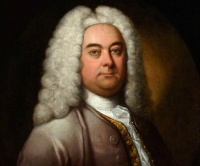
George Frideric (or Frederick) Handel (/ˈhændəl/; born Georg Friederich Händel (About this soundlisten); 23 February 1685 (O.S.) – 14 April 1759) was a German, later British, Baroque composer who spent the bulk of his career in London, becoming well known for his operas, oratorios, anthems, and organ concertos. Handel received important training in Halle and worked as a composer in Hamburg and Italy before settling in London in 1712; he became a naturalised British subject in 1727. He was strongly influenced both by the great composers of the Italian Baroque and by the middle-German polyphonic choral tradition
Jean Sibelius

Jean Sibelius ( pronunciation (help·info)) (8 December 1865 – 20 September 1957) was a Finnish composer of the later Romantic period whose music played an important role in the formation of the Finnish national identity. His mastery of the orchestra has been described as "prodigious."
The core of Sibelius's oeuvre is his set of seven symphonies. Like Beethoven, Sibelius used each successive work to further develop his own personal compositional style. His works continue to be performed frequently in the concert hall and are often recorded.
In addition to the symphonies, Sibelius's best-known compositions include Finlandia, the Karelia Suite, Valse triste, the Violin Concerto in D minor and The Swan of Tuonela (one of the four movements of the Lemminkäinen Suite). Other works include pieces inspired by the Finnish national epic, the Kalevala; over 100 songs for voice and piano; incidental music for 13 plays; the opera Jungfrun i tornet (The Maiden in the Tower); chamber music; piano music; Masonic ritual music; and 21 separate publications of choral music.
The core of Sibelius's oeuvre is his set of seven symphonies. Like Beethoven, Sibelius used each successive work to further develop his own personal compositional style. His works continue to be performed frequently in the concert hall and are often recorded.
In addition to the symphonies, Sibelius's best-known compositions include Finlandia, the Karelia Suite, Valse triste, the Violin Concerto in D minor and The Swan of Tuonela (one of the four movements of the Lemminkäinen Suite). Other works include pieces inspired by the Finnish national epic, the Kalevala; over 100 songs for voice and piano; incidental music for 13 plays; the opera Jungfrun i tornet (The Maiden in the Tower); chamber music; piano music; Masonic ritual music; and 21 separate publications of choral music.
Mozart

Wolfgang Amadeus Mozart, full name Johann Chrysostom Wolfgang Amadeus Mozart (27 January 1756 â 5 December 1791) was a prolific and influential composer of the Classical era. His over 600 compositions include works widely acknowledged as pinnacles of symphonic, concertante, chamber, piano, operatic, and choral music. Mozart is among the most enduringly popular of classical composers, and many of his works are part of the standard concert repertoire.
Mozart's music, like Haydn's, stands as an archetypal example of the Classical style. His works spanned the period during which that style transformed from one exemplified by the style galant to one that began to incorporate some of the contrapuntal complexities of the late Baroque, complexities against which the galant style had been a reaction. Mozart's own stylistic development closely paralleled the development of the classical style as a whole. In addition, he was a versatile composer and wrote in almost every major genre, including symphony, opera, the solo concerto, chamber music including string quartet and string quintet, and the piano sonata. While none of these genres were new, the piano concerto was almost single-handedly developed and popularized by Mozart. He also wrote a great deal of religious music, including masses; and he composed many dances, divertimenti, serenades, and other forms of light entertainment.
The central traits of the classical style can be identified in Mozart's music. Clarity, balance, and transparency are hallmarks of his work.
Mozart's music, like Haydn's, stands as an archetypal example of the Classical style. His works spanned the period during which that style transformed from one exemplified by the style galant to one that began to incorporate some of the contrapuntal complexities of the late Baroque, complexities against which the galant style had been a reaction. Mozart's own stylistic development closely paralleled the development of the classical style as a whole. In addition, he was a versatile composer and wrote in almost every major genre, including symphony, opera, the solo concerto, chamber music including string quartet and string quintet, and the piano sonata. While none of these genres were new, the piano concerto was almost single-handedly developed and popularized by Mozart. He also wrote a great deal of religious music, including masses; and he composed many dances, divertimenti, serenades, and other forms of light entertainment.
The central traits of the classical style can be identified in Mozart's music. Clarity, balance, and transparency are hallmarks of his work.
César Franck
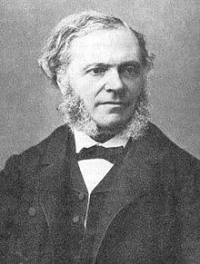
César-Auguste-Jean-Guillaume-Hubert Franck was a composer, pianist, organist, and music teacher who worked in Paris during his adult life. He was born at Liège, in what is now Belgium. He gave his first concerts there in 1834 and studied privately in Paris from 1835, where his teachers included Anton Reicha.
Franz Schubert

Franz Peter Schubert (German pronunciation: ; January 31, 1797 – November 19, 1828) was an Austrian composer. He wrote some 600 Lieder, nine symphonies (including the famous "Unfinished Symphony"), liturgical music, operas, some incidental music, and a large body of chamber and solo piano music. He is particularly noted for his original melodic and harmonic writing.
Schubert was born into a musical family, and received formal musical training through much of his childhood. While Schubert had a close circle of friends and associates who admired his work (amongst them the prominent singer Johann Michael Vogl), wide appreciation of his music during his lifetime was limited at best. He was never able to secure adequate permanent employment, and for most of his career he relied on the support of friends and family. He made some money from published works, and occasionally gave private musical instruction. In the last year of his life he began to receive wider acclaim. He died at the age of 31 of "typhoid fever", a diagnosis which was vague at the time; several scholars suspect the real illness was tertiary syphilis.
Interest in Schubert's work increased dramatically in the decades following his death. Composers like Franz Liszt, Robert Schumann and Felix Mendelssohn discovered, collected, and championed his works in the 19th century, as did musicologist Sir George Grove. Franz Schubert is now widely considered to be one of the greatest composers in the Western tradition.
Schubert was born into a musical family, and received formal musical training through much of his childhood. While Schubert had a close circle of friends and associates who admired his work (amongst them the prominent singer Johann Michael Vogl), wide appreciation of his music during his lifetime was limited at best. He was never able to secure adequate permanent employment, and for most of his career he relied on the support of friends and family. He made some money from published works, and occasionally gave private musical instruction. In the last year of his life he began to receive wider acclaim. He died at the age of 31 of "typhoid fever", a diagnosis which was vague at the time; several scholars suspect the real illness was tertiary syphilis.
Interest in Schubert's work increased dramatically in the decades following his death. Composers like Franz Liszt, Robert Schumann and Felix Mendelssohn discovered, collected, and championed his works in the 19th century, as did musicologist Sir George Grove. Franz Schubert is now widely considered to be one of the greatest composers in the Western tradition.
Sally DeFord

Sally DeFord Musical artist Born: 1959 (age 60 years), Eugene, Oregon, United States
Record labels: Defordmusic, Defordmusic.com, Sally DeFord Music, Sally DeFord
Genres: Alt Contemporary Christian, Christian/Gospel
Albums: He Is My Song, MORE
Record labels: Defordmusic, Defordmusic.com, Sally DeFord Music, Sally DeFord
Genres: Alt Contemporary Christian, Christian/Gospel
Albums: He Is My Song, MORE
Felix Mendelssohn

Jakob Ludwig Felix Mendelssohn Bartholdy, born, and generally known in English-speaking countries, as Felix Mendelssohn (February 3, 1809 – November 4, 1847) was a German composer, pianist, organist and conductor of the early Romantic period.
The grandson of the philosopher Moses Mendelssohn, he was born into a notable Jewish family, although he himself was brought up initially without religion, and later as a Lutheran. He was recognized early as a musical prodigy, but his parents were cautious and did not seek to capitalise on his abilities. Indeed his father was disinclined to allow Felix to follow a musical career until it became clear that he intended to seriously dedicate himself to it.
Early success in Germany was followed by travel throughout Europe; Mendelssohn was particularly well received in England as a composer, conductor and soloist, and his ten visits there, during which many of his major works were premiered, form an important part of his adult career. His essentially conservative musical tastes however set him apart from many of his more adventurous musical contemporaries such as Liszt, Wagner and Berlioz. The Conservatory he founded at Leipzig became a bastion of this anti-radical outlook.
Mendelssohn's work includes symphonies, concerti, oratorios, piano and chamber music. He also had an important role in the revival of interest in the music of Johann Sebastian Bach. After a long period of relative denigration due to changing musical tastes and antisemitism in the late 19th and early 20th centuries, his creative originality is now being recognized and re-evaluated. He is now among the most popular composers of the Romantic era.
The grandson of the philosopher Moses Mendelssohn, he was born into a notable Jewish family, although he himself was brought up initially without religion, and later as a Lutheran. He was recognized early as a musical prodigy, but his parents were cautious and did not seek to capitalise on his abilities. Indeed his father was disinclined to allow Felix to follow a musical career until it became clear that he intended to seriously dedicate himself to it.
Early success in Germany was followed by travel throughout Europe; Mendelssohn was particularly well received in England as a composer, conductor and soloist, and his ten visits there, during which many of his major works were premiered, form an important part of his adult career. His essentially conservative musical tastes however set him apart from many of his more adventurous musical contemporaries such as Liszt, Wagner and Berlioz. The Conservatory he founded at Leipzig became a bastion of this anti-radical outlook.
Mendelssohn's work includes symphonies, concerti, oratorios, piano and chamber music. He also had an important role in the revival of interest in the music of Johann Sebastian Bach. After a long period of relative denigration due to changing musical tastes and antisemitism in the late 19th and early 20th centuries, his creative originality is now being recognized and re-evaluated. He is now among the most popular composers of the Romantic era.
Jerry Goldsmith
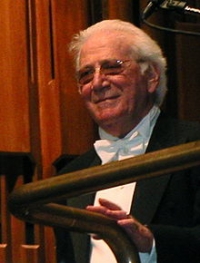
Jerrald King "Jerry" Goldsmith (February 10, 1929 – July 21, 2004) was an American composer and conductor most known for his work in film and television scoring.
He composed scores for such noteworthy films as The Sand Pebbles, Planet of the Apes, Patton, Chinatown, The Wind and the Lion, The Omen, The Boys from Brazil, Alien, Poltergeist, Gremlins, Hoosiers, Total Recall, Basic Instinct, Rudy, Air Force One, L.A. Confidential, Mulan, The Mummy, three Rambo films, and five Star Trek films. He was nominated for six Grammy Awards, nine Golden Globes, four BAFTAs, and seventeen Academy Awards. In 1977 he was awarded an Oscar for The Omen.
He collaborated with some of the most prolific directors in film history, including Robert Wise (The Sand Pebbles, Star Trek: The Motion Picture), Howard Hawks (Rio Lobo), Otto Preminger (In Harm's Way), Joe Dante (Gremlins, The 'Burbs, Small Soldiers), Roman Polanski (Chinatown), Ridley Scott (Alien, Legend), Steven Spielberg (Poltergeist, Twilight Zone: The Movie), and Paul Verhoeven (Total Recall, Basic Instinct). However, his most notable collaboration was arguably that with Franklin J. Schaffner, for whom Goldsmith scored such films as Planet of the Apes, Patton, Papillon, and The Boys from Brazil.
He composed scores for such noteworthy films as The Sand Pebbles, Planet of the Apes, Patton, Chinatown, The Wind and the Lion, The Omen, The Boys from Brazil, Alien, Poltergeist, Gremlins, Hoosiers, Total Recall, Basic Instinct, Rudy, Air Force One, L.A. Confidential, Mulan, The Mummy, three Rambo films, and five Star Trek films. He was nominated for six Grammy Awards, nine Golden Globes, four BAFTAs, and seventeen Academy Awards. In 1977 he was awarded an Oscar for The Omen.
He collaborated with some of the most prolific directors in film history, including Robert Wise (The Sand Pebbles, Star Trek: The Motion Picture), Howard Hawks (Rio Lobo), Otto Preminger (In Harm's Way), Joe Dante (Gremlins, The 'Burbs, Small Soldiers), Roman Polanski (Chinatown), Ridley Scott (Alien, Legend), Steven Spielberg (Poltergeist, Twilight Zone: The Movie), and Paul Verhoeven (Total Recall, Basic Instinct). However, his most notable collaboration was arguably that with Franklin J. Schaffner, for whom Goldsmith scored such films as Planet of the Apes, Patton, Papillon, and The Boys from Brazil.
Beethoven

Ludwig van Beethoven (16 December 1770 - 26 March 1827) was a German composer and pianist. He was a crucial figure in the transitional period between the Classical and Romantic eras in Western classical music, and remains one of the most respected and influential composers of all time.
Born in Bonn, then in the Electorate of Cologne (now in modern-day Germany), he moved to Vienna in his early twenties and settled there, studying with Joseph Haydn and quickly gaining a reputation as a virtuoso pianist. Beethoven's hearing gradually deteriorated beginning in his twenties, yet he continued to compose masterpieces, and to conduct and perform, even after he was completely deaf.
Born in Bonn, then in the Electorate of Cologne (now in modern-day Germany), he moved to Vienna in his early twenties and settled there, studying with Joseph Haydn and quickly gaining a reputation as a virtuoso pianist. Beethoven's hearing gradually deteriorated beginning in his twenties, yet he continued to compose masterpieces, and to conduct and perform, even after he was completely deaf.
Ferrucio Busoni
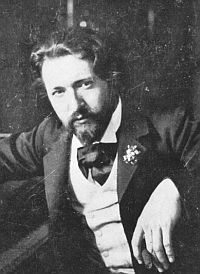
Ferruccio (Dante Michelangelo Benvenuto) Busoni (April 1, 1866 – July 27, 1924) was an Italian composer, pianist, editor, writer, piano and composition teacher, and conductor.
Most of Busoni's works are for the piano. Busoni's music is typically contrapuntally complex, with several melodic lines unwinding at once. Although his music is never entirely atonal in the Schoenbergian sense, his mature works, beginning with the Elegies, are often in indeterminate key. He was in contact with Schoenberg, and made a 'concert interpretation' of the latter's 'atonal' Piano Piece, Op. 11, No. 2 (BV B 97), in 1909. In the program notes for the premiere of his own Sonatina seconda of 1912, Busoni calls the work senza tonalità (without tonality). Johann Sebastian Bach and Franz Liszt were key influences, though late in his career much of his music has a neo-classical bent, and includes melodies resembling Mozart's.
Some idea of Busoni's mature attitude to composition can be gained from his 1907 manifesto, Sketch of a New Aesthetic of Music, a publication somewhat controversial in its time. As well as discussing then little-explored areas such as electronic music and microtonal music (both techniques he never employed), he asserted that music should distill the essence of music of the past to make something new.
Many of Busoni's works are based on music of the past, especially on the music of Johann Sebastian Bach (see below). The first version of Busoni's largest and best known solo piano work, Fantasia Contrappuntistica, was published in 1910. About half an hour in length, it is essentially an extended fantasy on the final incomplete fugue from Bach's The Art of Fugue. It uses several melodic figures found in Bach's work, most notably the BACH motif (B flat, A, C, B natural). Busoni revised the work a number of times and arranged it for two pianos. Versions have also been made for organ and for orchestra.
Most of Busoni's works are for the piano. Busoni's music is typically contrapuntally complex, with several melodic lines unwinding at once. Although his music is never entirely atonal in the Schoenbergian sense, his mature works, beginning with the Elegies, are often in indeterminate key. He was in contact with Schoenberg, and made a 'concert interpretation' of the latter's 'atonal' Piano Piece, Op. 11, No. 2 (BV B 97), in 1909. In the program notes for the premiere of his own Sonatina seconda of 1912, Busoni calls the work senza tonalità (without tonality). Johann Sebastian Bach and Franz Liszt were key influences, though late in his career much of his music has a neo-classical bent, and includes melodies resembling Mozart's.
Some idea of Busoni's mature attitude to composition can be gained from his 1907 manifesto, Sketch of a New Aesthetic of Music, a publication somewhat controversial in its time. As well as discussing then little-explored areas such as electronic music and microtonal music (both techniques he never employed), he asserted that music should distill the essence of music of the past to make something new.
Many of Busoni's works are based on music of the past, especially on the music of Johann Sebastian Bach (see below). The first version of Busoni's largest and best known solo piano work, Fantasia Contrappuntistica, was published in 1910. About half an hour in length, it is essentially an extended fantasy on the final incomplete fugue from Bach's The Art of Fugue. It uses several melodic figures found in Bach's work, most notably the BACH motif (B flat, A, C, B natural). Busoni revised the work a number of times and arranged it for two pianos. Versions have also been made for organ and for orchestra.
Pablo de Sarasate

Pablo Martín Melitón de Sarasate y Navascués (10 March 1844 – 20 September 1908) was a Spanish violinist and composer of the Romantic period.
Nobuo Uematsu

Nobuo Uematsu (植松伸夫 Uematsu Nobuo?, born March 21, 1959) is a Japanese video game composer and musician, best known for scoring the majority of titles in the Final Fantasy series. He is regarded as one of the most famous and respected composers in the video game community. Uematsu is a self-taught musician; he began to play the piano at the age of eleven or twelve, with Elton John as his biggest influence.
Uematsu joined Square (later Square Enix) in 1985, where he met Final Fantasy creator Hironobu Sakaguchi. They have worked together on numerous titles, most notably the games in the Final Fantasy series. After nearly 20 years in the company, he left Square Enix in 2004 and founded his own company called Smile Please, as well as the music production company Dog Ear Records. He has since composed music as a freelancer for video games primarily developed by Square Enix and Sakaguchi's development studio Mistwalker.
A handful of soundtracks and arranged albums of Uematsu's game scores have been released. Pieces from his video game works have been performed in concerts worldwide, and numerous Final Fantasy concerts have also been held. He has worked with Grammy Award-winning conductor Arnie Roth on several of these concerts. In 2002, he formed a rock band with colleagues Kenichiro Fukui and Tsuyoshi Sekito called The Black Mages, in which Uematsu plays the keyboard. The band plays arranged rock versions of Uematsu's Final Fantasy compositions.
Uematsu joined Square (later Square Enix) in 1985, where he met Final Fantasy creator Hironobu Sakaguchi. They have worked together on numerous titles, most notably the games in the Final Fantasy series. After nearly 20 years in the company, he left Square Enix in 2004 and founded his own company called Smile Please, as well as the music production company Dog Ear Records. He has since composed music as a freelancer for video games primarily developed by Square Enix and Sakaguchi's development studio Mistwalker.
A handful of soundtracks and arranged albums of Uematsu's game scores have been released. Pieces from his video game works have been performed in concerts worldwide, and numerous Final Fantasy concerts have also been held. He has worked with Grammy Award-winning conductor Arnie Roth on several of these concerts. In 2002, he formed a rock band with colleagues Kenichiro Fukui and Tsuyoshi Sekito called The Black Mages, in which Uematsu plays the keyboard. The band plays arranged rock versions of Uematsu's Final Fantasy compositions.
Tracy Chapman
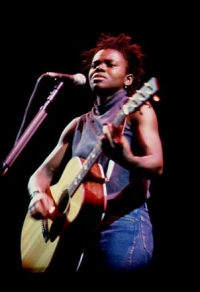
Tracy Chapman (born March 30, 1964) is an American singer-songwriter, best known for her singles "Fast Car", "Talkin' 'bout a Revolution", "Baby Can I Hold You", "Give Me One Reason" "The Promise" and "Telling Stories". She is a multi-platinum and four-time Grammy Award-winning artist.
Born in Cleveland, Ohio, Tracy Chapman began playing guitar and writing songs at the age of eleven. She was quickly accepted into the program A Better Chance, which enabled her to attend one of the finest string musical schools in the world, Wooster School in Connecticut; she was eventually accepted to Tufts University.
In May 2004, Tufts honored her with an honorary degree of Doctor of Fine Arts, for her strongly-committed contributions as a socially conscious and artistically accomplished musician.
Chapman often performs at and attends Make Poverty History charity events such as amfAR and AIDS/LifeCycle.
Although Chapman has never spoken publicly about her sexuality, Pulitzer Prize-winning author Alice Walker discussed her love affair with Chapman in an interview with The Guardian on December 15, 2006. She explained why they did not go public with their relationship at the time (the mid 1990s), saying, " was delicious and lovely and wonderful and I totally enjoyed it and I was completely in love with her, but it was not anybody's business but ours."
Born in Cleveland, Ohio, Tracy Chapman began playing guitar and writing songs at the age of eleven. She was quickly accepted into the program A Better Chance, which enabled her to attend one of the finest string musical schools in the world, Wooster School in Connecticut; she was eventually accepted to Tufts University.
In May 2004, Tufts honored her with an honorary degree of Doctor of Fine Arts, for her strongly-committed contributions as a socially conscious and artistically accomplished musician.
Chapman often performs at and attends Make Poverty History charity events such as amfAR and AIDS/LifeCycle.
Although Chapman has never spoken publicly about her sexuality, Pulitzer Prize-winning author Alice Walker discussed her love affair with Chapman in an interview with The Guardian on December 15, 2006. She explained why they did not go public with their relationship at the time (the mid 1990s), saying, " was delicious and lovely and wonderful and I totally enjoyed it and I was completely in love with her, but it was not anybody's business but ours."
amanda palmer

Amanda MacKinnon Gaiman Palmer (born April 30, 1976), sometimes known as Amanda Fucking Palmer, is an American singer, songwriter, musician, author, and performance artist who was the lead vocalist, pianist, and lyricist of the duo The Dresden Dolls. She performs as a solo artist, and was also one-half of the duo Evelyn Evelyn, and the lead singer and songwriter of Amanda Palmer and the Grand Theft Orchestra.
Chopin

Frédéric Chopin (1 March 1810 – 17 October 1849) was a Polish composer and virtuoso pianist of the Romantic period. He is widely regarded as the greatest Polish composer, and ranks as one of music's greatest tone poets.
He was born in the village of Żelazowa Wola, in the Duchy of Warsaw, to a Polish mother and French-expatriate father, and in his early life was regarded as a child-prodigy pianist. In November 1830, at the age of 20, Chopin went abroad; following the suppression of the Polish November Uprising of 1830–31, he became one of many expatriates of the Polish "Great Emigration."
In Paris, he made a comfortable living as a composer and piano teacher, while giving few public performances. A Polish patriot,
Chopin's extant compositions were written primarily for the piano as a solo instrument. Though technically demanding, Chopin's style emphasizes nuance and expressive depth rather than virtuosity. Chopin invented musical forms such as the ballade and was responsible for major innovations in forms such as the piano sonata, waltz, nocturne, étude, impromptu and prelude. His works are mainstays of Romanticism in 19th-century classical music.
He was born in the village of Żelazowa Wola, in the Duchy of Warsaw, to a Polish mother and French-expatriate father, and in his early life was regarded as a child-prodigy pianist. In November 1830, at the age of 20, Chopin went abroad; following the suppression of the Polish November Uprising of 1830–31, he became one of many expatriates of the Polish "Great Emigration."
In Paris, he made a comfortable living as a composer and piano teacher, while giving few public performances. A Polish patriot,
Chopin's extant compositions were written primarily for the piano as a solo instrument. Though technically demanding, Chopin's style emphasizes nuance and expressive depth rather than virtuosity. Chopin invented musical forms such as the ballade and was responsible for major innovations in forms such as the piano sonata, waltz, nocturne, étude, impromptu and prelude. His works are mainstays of Romanticism in 19th-century classical music.
jy
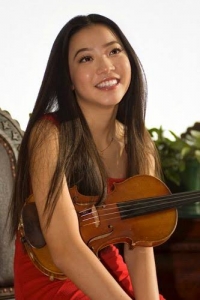
Jennifer is a professional opera singer,violin who has performed internationally and ... he was the Teaching Assistant to the Boston University Concert Band and has ... A native of New York, Colleen Bennett began her studies on the violin at the age .... Currently, Ryan teaches tuba and euphonium at the Aaron Copland School of ...
Eugene Ysaye
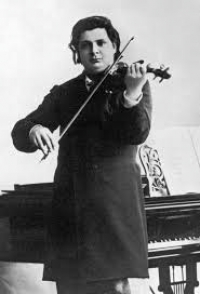
Eugène Ysaÿe (French: ; 16 July 1858 – 12 May 1931) was a Belgian violinist, composer and conductor. He was regarded as "The King of the Violin", or, as Nathan Milstein put it, the "tsar".
Gabriel Faure

Gabriel Urbain Fauré (12 May 1845 – 4 November 1924) was a French composer, organist, pianist, and teacher. He was the foremost French composer of his generation, and his musical style influenced many 20th century composers. His harmonic and melodic language affected how harmony was later taught.
 Sheet Music Giant is a site for those who wants to access popular sheet music easily,
letting them download the sheet music for free for trial purposes.
It's completely free to download and try the listed sheet music, but you have to delete the files after 24 hours of trial.
Don't forget, if you like the piece of music you have just learned playing,
treat the artist with respect, and go buy the original sheet music.
Sheet Music Giant is a site for those who wants to access popular sheet music easily,
letting them download the sheet music for free for trial purposes.
It's completely free to download and try the listed sheet music, but you have to delete the files after 24 hours of trial.
Don't forget, if you like the piece of music you have just learned playing,
treat the artist with respect, and go buy the original sheet music.
